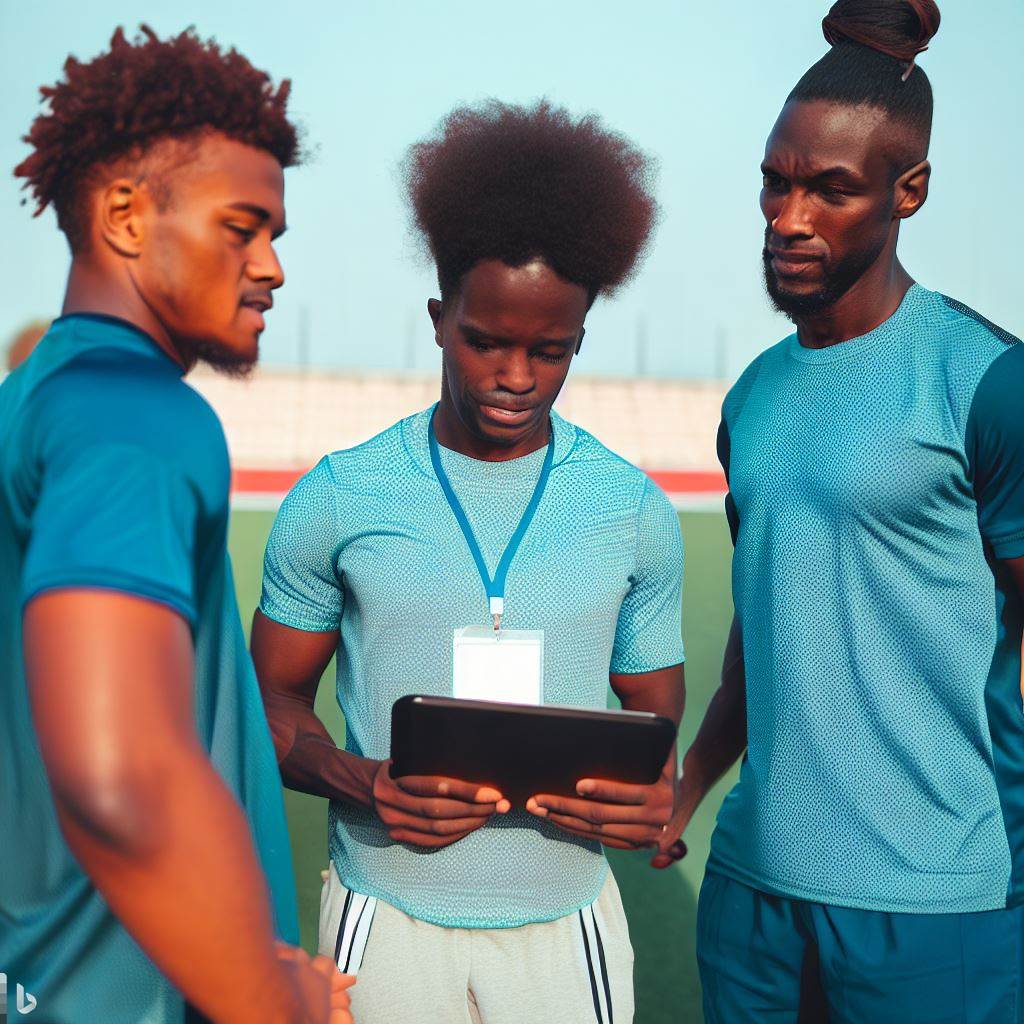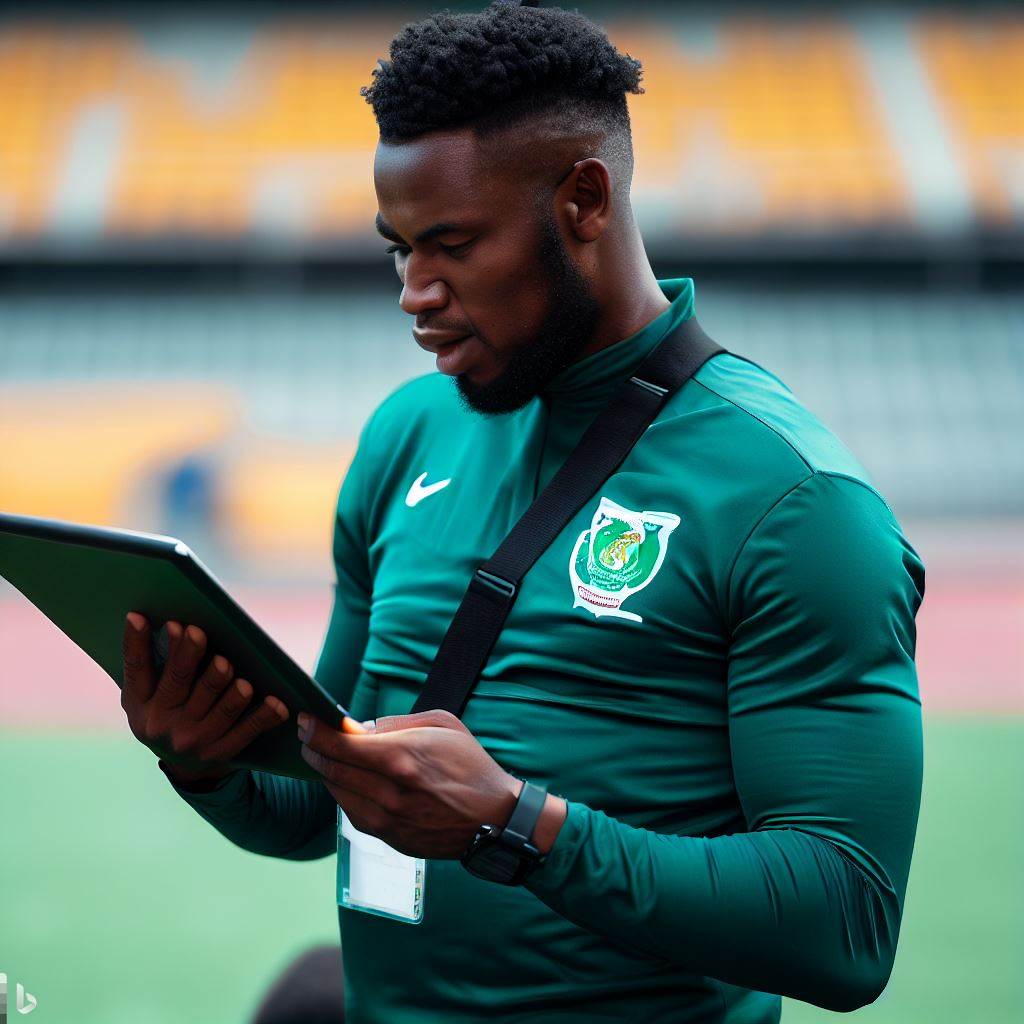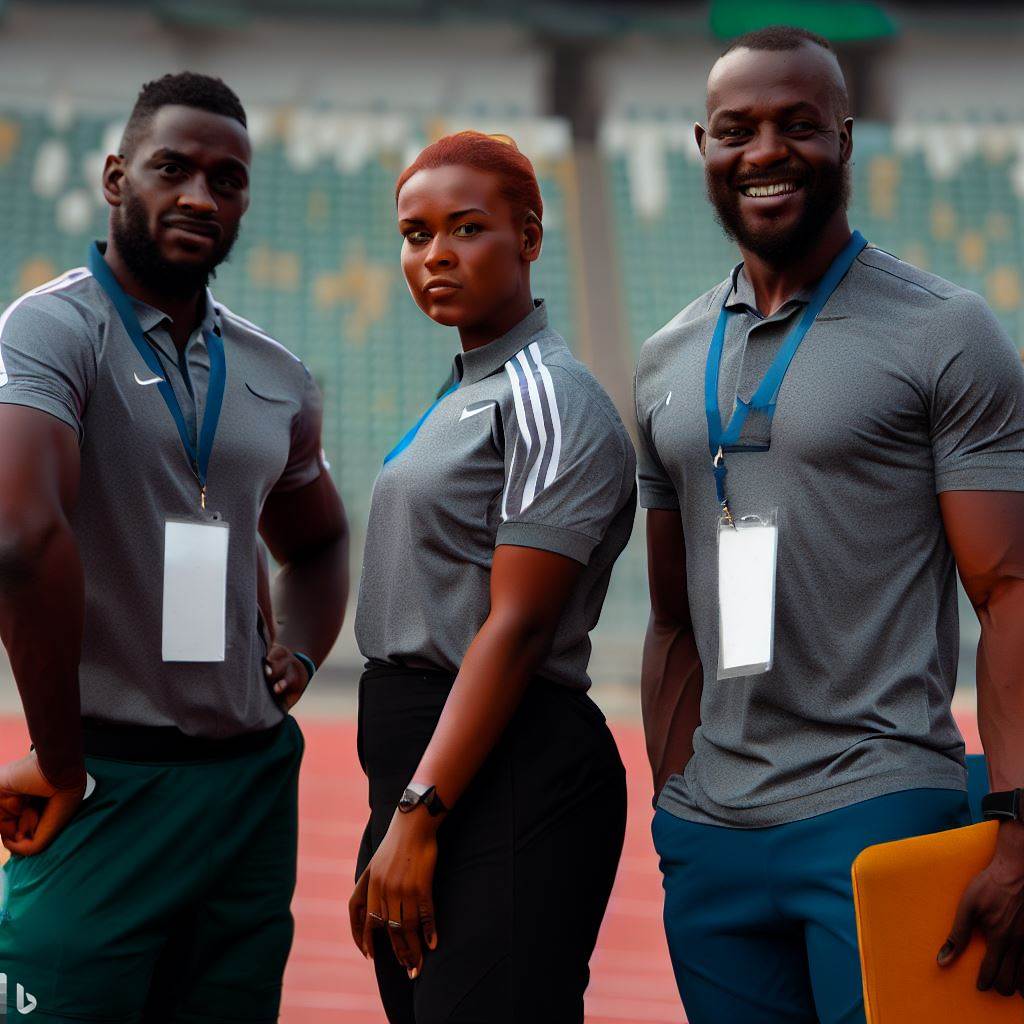Introduction
Explore the world of Assistant Athletic Trainer jobs opportunities in Nigeria’s sports and fitness industry.
A. Brief introduction on assistant athletic trainer jobs in Nigeria
Assistant Athletic Trainer Jobs Opportunities in Nigeria are soaring in demand as Nigerian athletes gain international prominence.
With Nigerian athletes rising internationally, Assistant Athletic Trainer Jobs Opportunities in Nigeria have surged. Trainers are vital for athlete well-being and performance.
B. Increasing demand for athletic trainers in the country
Assistant Athletic Trainer Jobs Opportunities in Nigeria shine during major sporting events like football tournaments, athletics championships, and boxing matches.
The nation’s sports passion opens doors for trainers to enhance athlete performance and fitness.
Additionally, the emphasis on physical fitness among Nigerians fuels the demand for Assistant Athletic Trainer Jobs Opportunities in Nigeria.
As more people embrace exercise, professional guidance is increasingly sought after.
In summary, Assistant Athletic Trainer Job Opportunities in Nigeria thrive amidst the nation’s burgeoning sports scene and growing fitness awareness.
Overview of Athletic Training
Athletic training is a field that focuses on the prevention, assessment, treatment, and rehabilitation of injuries incurred during sports or physical activities.
It plays a vital role in ensuring the well-being of athletes and promoting their optimal performance.
Athletic trainers are highly trained professionals who work closely with athletes, coaches, and healthcare providers to address various aspects of an athlete’s health and performance.
They play a critical role in injury prevention, as well as the prompt and effective management of injuries when they do occur.
A. Importance of Athletic Trainers for Injury Prevention and Rehabilitation
- Athletic trainers possess an in-depth understanding of sports-related injuries and their underlying causes.
- They work proactively to design and implement injury prevention programs tailored to the specific needs of athletes
- These programs include warm-up routines, conditioning exercises, and proper technique training.
- Athletic trainers also educate athletes on the importance of proper nutrition, hydration, and rest for injury prevention.
- When injuries do occur, athletic trainers are the first responders on the field.
- They assess the severity of injuries and provide immediate care through basic first aid or advanced life support techniques.
- They stabilize injured athletes, minimize further damage, and facilitate safe transportation to medical facilities if needed.
- Throughout the rehabilitation process, athletic trainers collaborate with healthcare professionals, such as physical therapists and orthopaedic surgeons.
- They develop comprehensive rehabilitation plans aimed at restoring athletes’ physical function and facilitating a safe return to sports.
- Athletic trainers also provide ongoing support, monitoring athletes’ progress, and making necessary modifications to their rehabilitation programs.
B. Expertise and Skills Required in Athletic Training
Successful athletic trainers possess a diverse range of expertise and skills necessary to excel in their roles:
- Anatomy and physiology knowledge enables them to understand the structure and mechanics of the human body.
- They have a deep understanding of sports biomechanics and how movements can lead to injuries.
- Emergency care skills enable athletic trainers to respond promptly to sudden injuries and provide immediate care.
- Strong observation and assessment abilities allow for accurate diagnosis of injuries and effective treatment planning.
- Exercise prescription skills help in designing personalized rehabilitation programs tailored to the unique needs of each athlete.
- Excellent communication skills are vital in interacting with athletes, coaches, and healthcare professionals.
- Problem-solving and decision-making abilities are crucial when dealing with complex injury scenarios.
- Organizational skills help athletic trainers manage multiple athletes, track progress, and maintain proper documentation.
- Empathy and emotional intelligence enable them to provide emotional support and create a positive environment for athletes.
- Continuing education and staying updated with the latest advancements in sports medicine are essential for their professional growth.
Athletic trainers play a significant role in the world of sports, contributing to the overall health and performance of athletes.
Their expertise in injury prevention and rehabilitation is indispensable, ensuring that athletes can compete at their highest level while minimizing the risk of injuries.
Read: Top Athletic Training Schools and Programs in Nigeria
Growing Sports Industry in Nigeria
The sports industry in Nigeria has experienced significant growth in recent years, opening up numerous opportunities for aspiring athletic trainers.
Let’s take a closer look at this industry’s growth and the resulting demand for skilled professionals.
A. Overview of the Sports Industry’s Growth in Nigeria
- The sports industry in Nigeria has expanded exponentially over the past decade.
- Increased interest in sports among Nigerians has fueled this growth.
- Nigeria’s large population and passion for sporting events have contributed to the industry’s success.
- The development of state-of-the-art sports facilities and infrastructure has attracted international attention.
- Government support and investment in sports have further accelerated the industry’s growth.
B. Emergence of Professional Leagues and Sports Teams
- Nigeria now boasts several professional leagues across various sports, including football, basketball, and athletics.
- The Nigerian Professional Football League, for instance, has gained recognition within Africa and beyond.
- Establishment of professional leagues has led to the formation of numerous sports teams competing at national and international levels.
- These teams require competent athletic trainers to ensure the well-being and performance of their athletes.
- Increased competition and financial investments in the leagues have made sports organizations prioritize the health and fitness of their athletes.
C. Job Opportunities for Athletic Trainers
- The growth of Nigeria’s sports industry has created a significant demand for qualified athletic trainers.
- Athletic trainers play a crucial role in preventing and treating sports-related injuries.
- Professional teams and leagues now recognize the importance of having well-trained athletic trainers on their staff.
- These trainers provide immediate medical attention, rehabilitation, and injury prevention strategies to athletes.
- The demand for athletic trainers extends beyond professional teams, as schools and sports academies now also seek their expertise.
Generally, the sports industry in Nigeria has undergone remarkable growth in recent years.
Professional leagues and sports teams have emerged, leading to increased job opportunities for athletic trainers.
Their specialized skills and knowledge are essential in keeping athletes in optimal physical condition, preventing injuries, and enhancing their performance.
With the industry’s continued expansion, the demand for athletic trainers in Nigeria is poised to grow even further.
Read: Women in Athletic Training: Voices from Nigeria’s Field
Assistant Athletic Trainer Job Responsibilities
Assistant athletic trainers actively contribute to the sports industry by providing vital support to athletes and coaching staff.
Their key responsibilities encompass:
- Assessing and Treating Injuries: Assistant athletic trainers actively evaluate injuries, diagnose conditions, and administer necessary treatments.
- Developing and Implementing Injury Prevention Programs: They collaboratively design and execute conditioning programs with the head athletic trainer and coaching staff to minimize injury risks.
- Assisting in Emergency Response: Preparedness is paramount; assistant athletic trainers are trained in first aid, CPR, and life-saving techniques to deliver immediate care during on-field and off-field emergencies.
- Educating Athletes on Injury Prevention and Treatment: They play a pivotal role in educating athletes on injury avoidance and overall well-being. This includes imparting proper techniques, providing guidance on nutrition and hydration, and advocating for healthy lifestyle habits.
- Maintaining Medical Records and Documentation: Detailed record-keeping is crucial. Assistant athletic trainers meticulously document injuries, treatments, and progress, facilitating athlete medical history tracking and information sharing with healthcare professionals.
- Collaborating with the Head Athletic Trainer: Close cooperation with the head athletic trainer is essential. Together, they formulate treatment plans, exchange information on injured athletes, and ensure a unified healthcare approach.
- Communicating with Coaching Staff: Regular updates to coaching staff regarding injured athletes, treatment strategies, and anticipated return-to-play timelines inform coaching decisions on player participation.
- Providing Rehabilitative Care: Assistant athletic trainers actively participate in athlete rehabilitation, guiding them through exercises, stretches, and therapies to expedite recovery and reduce the risk of re-injury.
- Assisting in Equipment Maintenance: They contribute to equipment upkeep, guaranteeing proper fitting, and recommending necessary adjustments to minimize injury possibilities.
- Supervising Practices and Competitions: Vigilant observation of practices and competitions identifies potential injuries or unsafe conditions, prompting immediate intervention when required. Effective communication and teamwork are pivotal to their success.
Assistant athletic trainers and the broader sports staff foster a safe and nurturing environment for optimal athlete performance and well-being.
Through cohesive collaboration with the head athletic trainer and coaching staff, they ensure effective injury management and prevention strategies.
Read: Becoming a Sports Journalist in Nigeria: A Step-by-Step Guide
Required Qualifications and Skills
When it comes to becoming an assistant athletic trainer in Nigeria, there are certain educational requirements, degrees, certifications, and licenses that are necessary.
Additionally, there are specific skills and experience desired for this position.
1. Educational Requirements
- Individuals aspiring to become assistant athletic trainers in Nigeria must have a minimum of a bachelor’s degree.
- A degree in athletic training, sports science, kinesiology, or a related field is typically required.
- Some employers may prefer candidates with a master’s degree in athletic training or a related discipline.
2. Relevant Degrees, Certifications, and Licenses
- Candidates for assistant athletic trainer positions should possess a degree in athletic training from a recognized institution.
- They must have obtained their certification as an athletic trainer from the appropriate licensing body.
- Other relevant certifications such as CPR, First Aid, and AED are commonly required.
- Candidates may also need to be registered members of professional athletic training organizations.
3. Desired Skills and Experience
- Assistant athletic trainers in Nigeria should have a solid understanding of sports medicine principles and practices.
- They must possess excellent interpersonal and communication skills to effectively work with athletes, coaches, and medical staff.
- Strong problem-solving and decision-making abilities are crucial in assessing and treating injuries.
- Experience working with athletes of various ages and skill levels is highly desirable.
- Knowledge of injury prevention strategies and rehabilitation techniques is essential in this role.
- Proficiency in using sports medicine-related software and equipment is an advantage.
- Flexibility and the ability to work in a fast-paced and high-pressure environment are important.
- Assistant athletic trainers should also be passionate about continuing education and staying updated with advancements in the field.
So, if you are considering a career as an assistant athletic trainer in Nigeria, you should plan to pursue a relevant bachelor’s degree in athletic training or a related field.
Additionally, obtaining the necessary certifications and licenses, such as an athletic trainer certification and CPR/First Aid/AED certifications, is crucial.
Gaining experience working with athletes and developing the desired skills will also enhance your chances of securing a position in this field.
Read: Importance of Local Diets in Sports Nutrition in Nigeria

Job Outlook and Opportunities
When it comes to the job market for assistant athletic trainers in Nigeria, there is a promising outlook.
- Increasing Demand: The demand for athletic trainers is on a steady rise across various sports organizations and facilities in Nigeria.
- Health and Fitness Industry: A growing health-conscious population is increasingly participating in sports and fitness activities, creating a heightened demand for assistant athletic trainers.
- Sports Academies: The emergence of sports academies and training centers has further fueled the need for qualified athletic trainers who can help athletes reach their peak performance.
- Professional Sports Teams: As Nigeria’s sports industry continues to flourish, professional sports teams are seeking the expertise of assistant athletic trainers to enhance the performance and well-being of their athletes.
- Specialization Opportunities: Within the athletic training field, various specialized areas like injury prevention, rehabilitation, and performance enhancement offer career growth prospects.
- Private Clinics and Hospitals: Assistant athletic trainers can explore opportunities in private medical clinics and hospitals where they collaborate with healthcare professionals to treat and rehabilitate athletes.
- Collaboration with Sports Scientists: Collaborative efforts between athletic trainers and sports scientists present additional avenues for career development, leading to more holistic athlete care.
- Research and Development: The evolving athletic training profession calls for ongoing research and development efforts to advance training techniques and methods.
- International Opportunities: Skilled assistant athletic trainers in Nigeria may seize international job prospects, particularly in countries with advanced sports facilities.
- Academic Institutions: Many Nigerian universities and colleges house sports programs that rely on assistant athletic trainers to support the health and performance of their student-athletes.
- Government Support: The Nigerian government’s increased investment in sports and wellness programs provides a conducive environment for assistant athletic trainers to thrive.
Despite these promising opportunities, competition for positions can be intense.
Aspiring assistant athletic trainers should prioritize acquiring the necessary qualifications and gaining valuable experience.
Challenges of Assistant Athletic Trainer Jobs in Nigeria
Assistant athletic trainers in Nigeria face several challenges in their profession.
These challenges can hinder their ability to provide optimal care and support to athletes.
Let’s discuss some of these challenges below:
1. Limited resources
- Assistant athletic trainers in Nigeria often have limited access to essential resources such as medical equipment, training facilities, and sports injury rehabilitation tools.
- This scarcity of resources can impede their ability to provide comprehensive care and rehabilitation services to athletes.
- Without proper resources, it becomes challenging for assistant athletic trainers to deliver quality treatment and prevent further injuries.
2. Infrastructure constraints
- Nigeria faces significant infrastructure challenges, including outdated or inadequate sports facilities and training grounds.
- This lack of proper infrastructure affects assistant athletic trainers’ ability to provide optimal training and rehabilitation programs for athletes.
- Poorly maintained facilities can increase the risk of accidents and injuries for athletes, making the trainers’ job more challenging.
3. Insufficient funding
- Funding is a crucial aspect of the successful functioning of assistant athletic trainer jobs.
- In Nigeria, there is often a lack of financial support and investment in sports medicine programs and facilities.
- This insufficiency of funding hampers the ability to train and hire qualified staff, acquire necessary equipment, and conduct research.
- Insufficient funding also limits the scope of outreach programs and initiatives aimed at promoting sports safety and injury prevention.
Although the challenges may seem daunting, there are ways to overcome them with proper support and investment:
1. Increased government support
- The Nigerian government should recognize the importance of sports medicine and allocate sufficient resources to develop and maintain sports infrastructure.
- Investing in sports facilities, training centers, and medical equipment will enhance the quality of care provided by assistant athletic trainers.
2. Collaboration with private sector
- The private sector can play a vital role in supporting assistant athletic trainers in Nigeria through sponsorships and partnerships.
- Corporate entities can contribute funds for training programs, infrastructure development, and research initiatives.
3. Education and awareness campaigns
- Organizations and professional bodies should organize educational programs to raise awareness about sports medicine and the vital role of assistant athletic trainers.
- By educating athletes, coaches, and administrators about the importance of proper training and injury prevention, we can mitigate challenges.
4. International collaborations
- Assistant athletic trainers can benefit from collaborations and partnerships with international organizations and experts.
- International exchange programs can provide further training opportunities and exposure to advanced techniques and resources.
Essentially, assistant athletic trainers in Nigeria face various challenges such as limited resources, infrastructure constraints, and insufficient funding.
However, by garnering government support, fostering collaborations, conducting educational campaigns, and seeking international partnerships, these challenges can be overcome.
With proper support and investment, assistant athletic trainers can enhance their ability to provide top-notch care and contribute to the development of sports medicine in Nigeria.
Tips for Pursuing a Career as an Assistant Athletic Trainer in Nigeria
1. Determine Your Passion and Interest
- Reflect on your love for sports and passion for helping athletes.
- Assess if you have the dedication and commitment required for this career.
2. Research the Field
- Explore the role and responsibilities of an assistant athletic trainer.
- Understand the demand, growth opportunities, and challenges in Nigeria.
3. Gain Relevant Education and Certification
- Enroll in a recognized athletic training program in Nigeria or abroad.
- Pursue relevant certifications such as those offered by the National Athletic Trainers’ Association (NATA).
4. Seek Internship and Volunteer Opportunities
- Apply for internships at sports organizations or universities to gain practical experience.
- Volunteer at local sports events to showcase your dedication and skills.
5. Network with Professional Athletic Trainers
- Attend conferences and seminars where you can meet experienced athletic trainers.
- Join professional associations like the Nigerian Athletic Trainers’ Association (NATA) to connect with industry professionals.
6. Be Proactive in Continuing Education
- Stay updated with the latest developments in sports medicine and athletic training.
- Participate in workshops, webinars, and online courses to enhance your knowledge and skills.
7. Build Strong Interpersonal Skills
- Develop effective communication and listening skills to build rapport with athletes and sports teams.
- Show empathy and compassion while working with injured athletes during their recovery process.
8. Stay Committed and Focused
- Embrace challenges and persevere through the demanding nature of the job.
- Stay motivated and dedicated to continuously improving your skills as an assistant athletic trainer.
In review, pursuing a career as an assistant athletic trainer in Nigeria requires dedication, relevant education, and practical experience.
By determining your passion, gaining appropriate qualifications, networking with professionals, and continuously improving your skills, you can position yourself for success in this rewarding field.
Remember, it’s not just a career, but an opportunity to make a positive impact on athletes’ well-being and performance.
Conclusion
Assistant athletic trainer jobs in Nigeria present exciting opportunities for individuals interested in sports and healthcare.
A. Key points discussed in the blog post
The key points discussed in this blog section include the role and responsibilities of assistant athletic trainers, the demand for these professionals in the Nigerian sports industry, and the benefits of pursuing this career path.
By working as assistant athletic trainers, individuals can contribute to the development and success of athletes in Nigeria while also gaining valuable experience in the sports industry.
C. Potential opportunities and rewards of assistant athletic trainer jobs in Nigeria
The potential opportunities and rewards include working with professional teams, universities, and sports organizations, as well as the chance to make a positive impact on athletes’ overall health and performance.
Readers are encouraged to explore this career path and consider becoming assistant athletic trainers in Nigeria.
By doing so, they can actively contribute to the growth and improvement of sports in the country while also shaping the future of healthcare in athletics.
With the increasing focus on sports and wellness, the demand for qualified and skilled assistant athletic trainers is expected to rise in the coming years.
So, take the leap and embark on an exciting journey in the field of sports medicine in Nigeria.




